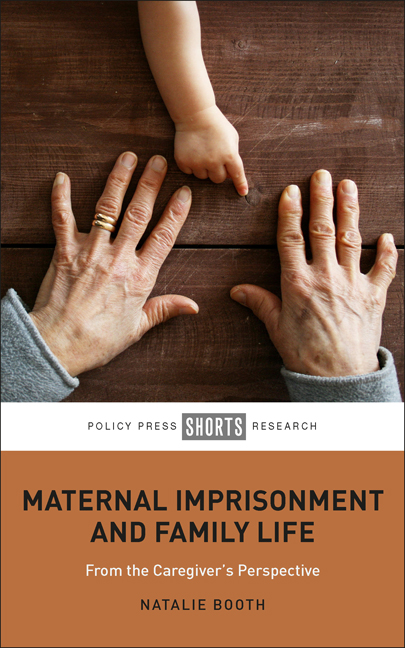Book contents
- Frontmatter
- Contents
- List of Tables
- Acknowledgements
- Preface: Linda’s Story
- One The Landscape of Maternal Imprisonment: Caregiving and Family Life
- Two Researching the Caregiver’S Lived Experiences
- Three Family Constructions and Caregiving Practices
- Four Renegotiating Family Life: Caregiving in the Aftermath of the Mother’S Imprisonment
- Five Navigating the Criminal Justice System
- Six Social Support, Familial Stigma and Release
- Seven Kin Caregiving: Occupying a Disenfranchised Status While Serving the Family Sentence
- Eight Reflections on the Research Process
- References
- Index
Eight - Reflections on the Research Process
Published online by Cambridge University Press: 10 March 2021
- Frontmatter
- Contents
- List of Tables
- Acknowledgements
- Preface: Linda’s Story
- One The Landscape of Maternal Imprisonment: Caregiving and Family Life
- Two Researching the Caregiver’S Lived Experiences
- Three Family Constructions and Caregiving Practices
- Four Renegotiating Family Life: Caregiving in the Aftermath of the Mother’S Imprisonment
- Five Navigating the Criminal Justice System
- Six Social Support, Familial Stigma and Release
- Seven Kin Caregiving: Occupying a Disenfranchised Status While Serving the Family Sentence
- Eight Reflections on the Research Process
- References
- Index
Summary
Introduction
This final chapter provides some brief reflections on the research process. There is concern that failing to share the intricacies and messiness of the research process might leave future researchers ill-prepared for the realities of prison research (Jewkes, 2016); meanwhile, the credibility of qualitative research can be enhanced by a thorough account of the research process (Guba, 1981; Shenton, 2004). Therefore, in this chapter, I will discuss the practical challenges of recruiting participants, the ethical issues of managing implicit withdrawal and a more personal reflection about how I consider my own identity to have shaped the data collected. I hope that this reflective chapter provides further information that contextualises the study presented in the book.
Practical challenges: recruitment
Not only is accessing prison difficult for researchers, involving several layers of gatekeepers located at both national and localised levels (Davies, 2000; Martin, 2000), but the family members of prisoners have also been identified as a particularly hard-to-reach population (Loucks, 2005; Codd, 2008; Wood, 2008). Therefore, this section provides a short commentary about the practicalities of ‘doing’ research in this field, and specifically how the 15 families were identified and recruited for the study.
My approach to recruitment was purposefully flexible. This meant that several different avenues were explored and used to identify eligible family members, including national media platforms, voluntary sector organisations, the prison visitors’ centre and the family engagement workers’ casework. I first attempted to promote the research using different media platforms that would be accessed by family members and practitioners linked to the prison system (for example, Inside Time and Clinks Light Lunch), which I considered to be well placed to identify potential participants. I also made direct contact with voluntary organisations working with prisoners’ family members in the community, and specifically those providing support groups. Condry (2007a, 2007b) and Codd (2002) had both identified and recruited family members using community support groups and so I expected that this may be a useful approach. However, one support group primarily worked with family members who had male relatives in prison and the other was collaborating with academics at another university.
- Type
- Chapter
- Information
- Maternal Imprisonment and Family LifeFrom the Caregiver's Perspective, pp. 181 - 188Publisher: Bristol University PressPrint publication year: 2020



